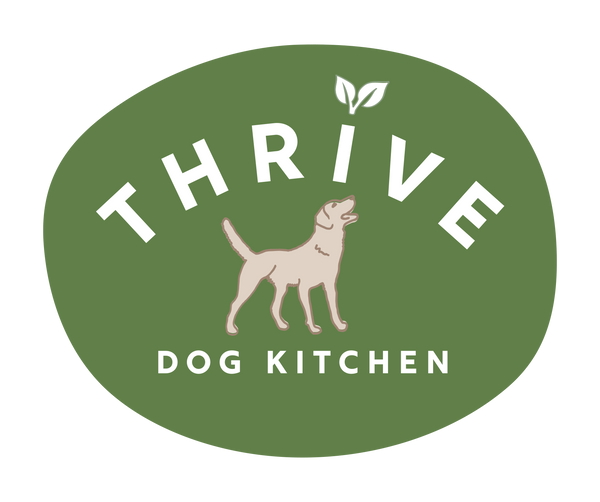
Why Most Homemade Dog Diets Fail (And How to Get It Right)
Share
As a certified canine nutritionist who advocates for homemade dog food, I thought I understood the landscape pretty well. Then I came across research that stopped me in my tracks. The findings reveal important insights about what makes homemade diets for dogs succeed or fail, and they're more encouraging than I expected. These are insights that every dog parent should understand.
The Study That Changed Everything We Thought We Knew
In 2013, researchers at UC Davis set out to do something that had never been done before: they would analyse 200 homemade dog diet recipes from every source imaginable. Books written by veterinarians, popular websites, pet care guides, even recipes created by veterinarians themselves.
What they found was: 95% of these recipes failed to provide adequate levels of at least one essential nutrient that dogs require. Even more concerning, 83% of the recipes had multiple nutrient deficiencies.
What the Research Really Revealed
The research revealed that recipes written by veterinarians were significantly less likely to have nutrient deficiencies than other sources, and when deficiencies occurred, they were less severe. Yet even among veterinary-created recipes, most still had at least one deficiency.
So what's really going on here?
The deficiencies weren't random. They followed predictable patterns. The most common missing nutrients were choline, vitamin D, zinc, and vitamin E. These specific gaps could result in health problems including immune dysfunction, fat accumulation in the liver, and musculoskeletal abnormalities.
The researchers also found that 92% of the recipes contained vague or incomplete instructions requiring dog parents to make assumptions about ingredients, preparation methods, or supplements. Furthermore, 85% did not provide calorie information or guidance about appropriate serving sizes.
This means even well-intentioned dog parents following published recipes were essentially flying blind.
Interestingly, the researchers found that rotation of different recipes, the popular "balance over time" concept, wasn't solving the problem when dog parents used recipes from the same sources, since so many recipes shared the same deficiencies.
However, this doesn't invalidate rotational feeding as an approach. It highlights that the approach requires understanding what nutrients might be missing and ensuring they're addressed across the rotation. Just like humans don't need every nutrient in every meal, dogs can achieve nutritional balance over time when the rotation is thoughtfully planned with awareness of potential gaps.
When Homemade Diets Are Done Right
Fast forward to 2024, and new research examines what happens when homemade diets are properly formulated by nutrition experts rather than sourced from books or the internet.
In a prospective study involving 167 dogs, both healthy and diseased, researchers implemented customised, complete and balanced homemade diets formulated by nutritionists.
But here's what's interesting about the results:
For healthy dogs: 70% showed improvements in coat condition, with coats becoming shinier and softer, while 47% experienced a decrease in bowel frequency.
For dogs with health issues, the results were even more dramatic: Among dogs with gastrointestinal disorders, 95% of dog parents observed symptom improvement in their dogs. For dogs with dermatological conditions, 83% of dog parents saw notable improvements. And for dogs suffering from both gastrointestinal and dermatological disorders? 100% of dog parents recorded an improvement of their dog's symptoms.
It's worth noting that the 2024 study relied on dog parent observations rather than clinical assessments, making the results subjective. Additionally, more research is needed to fully understand the long-term effects of properly formulated homemade diets. However, these initial findings provide encouraging insights into the potential benefits when professional guidance is involved.
The Critical Difference: Professional Formulation vs. Google Searches
The research reveals a clear pattern: the source of the recipe determines everything.
When homemade diets are properly formulated by qualified nutritionists, they can provide significant benefits including complete ingredient transparency, customisation for individual needs, less poop, and more control of what goes into their meals.
However, diets lacking input from nutrition experts may result in deficiencies or imbalances, potentially posing health risks to dogs.
The stark contrast in outcomes isn't about homemade diets themselves, it's about expertise in formulation.
What This Research Means for New Zealand Dog Parents
The research tells a clear story: homemade diets aren't inherently good or bad. Their success depends entirely on who formulates them and how.
If you're considering homemade dog food for your pet, the science shows that:
1. DIY dog food recipes from books, websites, or even well-meaning veterinarians may carry risks
2. Professional formulation by qualified canine nutritionists can improve outcomes
3. The benefits of properly formulated homemade dog diets can be substantial
4. Success requires ongoing guidance, not just a one-time recipe
The Bottom Line
The research reveals something both sobering and hopeful: most homemade diets fail not because the concept is flawed, but because they lack professional nutritional expertise in their formulation.
When done right, homemade diets can be transformative for dogs' health and wellbeing. When done wrong, they can cause serious nutritional deficiencies that may not become apparent for months or years.
The difference lies not in the ingredients or the love behind the preparation. It lies in the expertise behind the formulation.
The research is clear: properly formulated homemade diets can offer remarkable benefits for dogs, but success requires professional guidance. If you're curious about whether a homemade diet could benefit your dog, book a complimentary 15 minute chat with Hilary to learn more. Book a chat here.
Hilary Wilkie is a certified canine nutritionist and coach dedicated to making dog nutrition simple and approachable for New Zealand families. Through Thrive Dog Kitchen, she provides science-backed guidance that helps Kiwi dog parents feed their pets with confidence.
